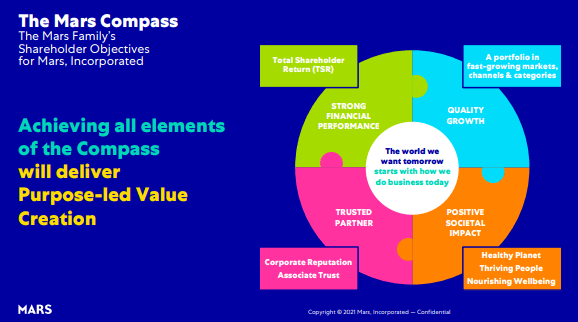
What
Mars, Incorporated, a family-owned consumer goods company, has set out its strategic objectives in the Mars Compass. The Compass is split into four quadrants:
- Strong financial performance
- Quality growth
- Positive societal impact
- Trusted partner
The first two quadrants capture the financial dimensions of the strategy. The second two quadrants are non-financial, reflecting the company’s Sustainable in a Generation Plan and other ESG commitments. The Sustainable in a Generation Plan includes targets to reduce greenhouse gas emissions, improve the working lives of a million people in the supply chain and support consumer wellbeing. Under the plan, which was launched in 2017, Mars will invest US$1 billion in sustainability initiatives.
A three-year integrated value creation plan (IVCP) process brings the Compass into business planning for all Mars segments and business units. The IVCP covers each business unit’s strategic ambition, transformation initiatives and portfolio of investments. The process is led by the strategy and financial planning and analysis (FP&A) teams – both part of the finance function.
Finance has led the work of integrating sustainability priorities into the IVCP process, applying focus and rigour to internal planning discussions and helping business units to balance trade-offs between financial and sustainability objectives.
The judging panel was particularly impressed with Mars’s integration of the strategy and finance functions with a clear emphasis on their integrated value creation plan and how this was embedded at both group level and in business units.
Why
Purpose is a driving force of Mars’s strategy and decision making. At the heart of the Compass is the company’s core belief, that ‘the world we want tomorrow starts with how we do business today’. This means thinking long-term and holistically about how Mars creates value. For Mars, both profit and purpose are integral elements of business.
As sustainability has emerged as a key priority for businesses and consumers alike, Mars considers its approach vital for de-risking the company, becoming more financially sustainable and staying relevant for new generations of consumers. And with the US$1 billion investment in the Sustainable in a Generation Plan, the company’s goal is to create transformational change rather than incremental improvement.
Creating a three-year IVCP process means that Mars can plan on a longer timeframe that is better suited to its sustainability priorities. This was designed to move the company away from a one-year planning cycle that prioritises short-term financial performance and growth, towards delivering on all four quadrants of the Compass.
At a company like ours, we think it’s important to recognise that purpose without profit isn’t possible. But profit without purpose is quite meaningless. So a business must pursue both.
How
Finance has provided vital support for embedding the Compass in the business:
- Strategy and FP&A teams are part of the finance function, both at group level and in the business units. This structure has helped to make sure that planning frameworks and processes reflect the company’s long-term strategic priorities and financial rigour is applied throughout.
- The four quadrants of the Compass provide a balance between financial and nonfinancial strategic priorities. This has enabled the company to take a longer-term view, accepting lower short-term returns in the finance-focused quadrants to make sure the company can deliver on its Sustainable in a Generation Plan. Remuneration for the top 300 company executives is linked to Compass KPIs – financial and nonfinancial.
- The IVCP brings the Compass to life throughout the business and drives business plans across all segments and brands. Planning discussions focus on sustainability goals as well as financial performance, including how Mars can invest in more sustainable, resilient supply chains and take advantage of new opportunities. Through the IVCP process, targets are set for each Compass quadrant.
- Before the IVCP numbers are finalised, formal IVCP reviews take place with each of the global segments. Any trade-offs are identified and consciously resolved in these meetings. Once the IVCP is in place, the CEO and the functional heads of the business units review the plan every quarter.
- Mars uses methods such as carbon-adjusted cost calculations to bring together sustainability and financial priorities in day-to-day decision making. This helps managers to act with a fuller understanding of relevant considerations, so that ultimately the company will be in a better position to meet its IVCP targets.
- Finance business partners play a key role in supporting staff to take account of a range of factors when making purchasing and other business decisions. As well as carbon-adjusted costs, this could include other sustainability considerations, such as water usage. This adjusted cost is an understandable measure that staff can use to compare different options and make decisions that are more closely aligned with the IVCP – and so the strategic priorities of the Compass.
About Mars
Mars is a consumer goods company based in the US. Its strategic objectives are set out in the Mars Compass, which balances profit and purpose across four dimensions. Two are financial (strong financial performance and quality growth) and two are non-financial (positive societal impact and being a trusted partner). A three-year Integrated Value Creation Plan, reviewed quarterly, sets out how all areas of the company will deliver on each Compass area. The finance team played a major role in embedding sustainability priorities into the planning process. The company’s balanced approach to business has resulted in a deforestation-free palm oil supply chain.
Download the case study
Want a copy of this case study? You can download a PDF version using the link below.
